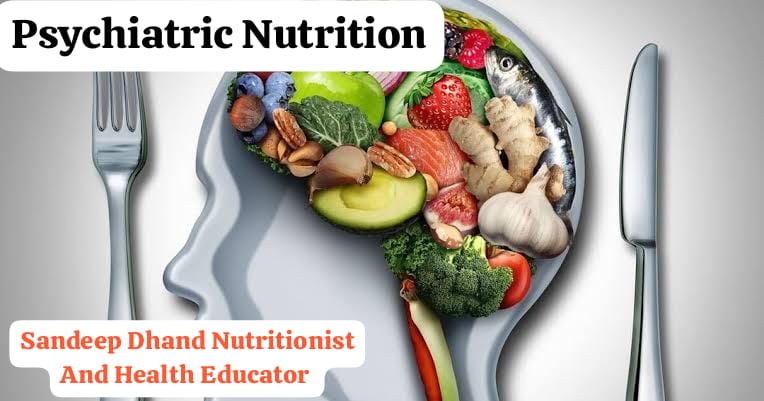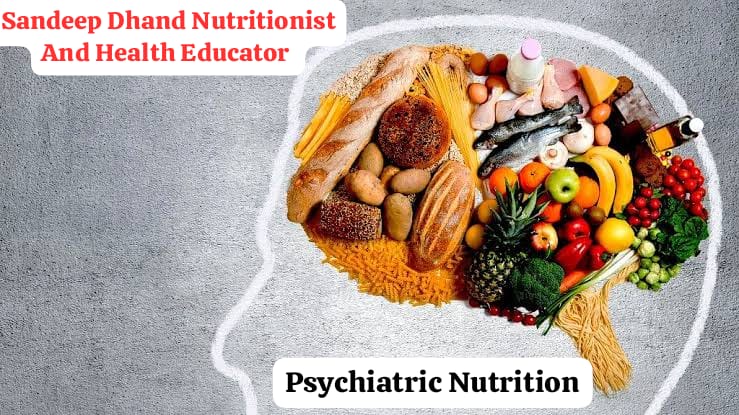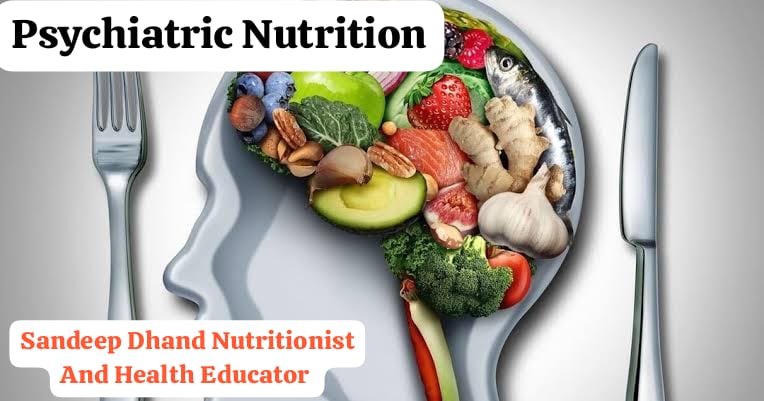Sandeep Dhand
Nutritionist And Health Educator
Psychiatry is a medical field that focuses on understanding, diagnosing, and treating mental health disorders such as depression, anxiety, bipolar disorder, and schizophrenia. Treatment often involves therapy, medication, or a combination of both to support mental well-being and improve quality of life.
An emerging area within this field is psychiatric nutrition, or nutritional psychiatry. This discipline examines how diet and nutrition affect mental health. It looks at the role of specific nutrients and overall dietary habits in influencing brain function, mood, and behavior. Research shows that a balanced diet can help manage and even prevent conditions like anxiety, depression, ADHD, and schizophrenia.

As mental health challenges increase worldwide, psychiatric nutrition highlights the importance of food as part of a holistic approach to care. By integrating proper nutrition into treatment plans, individuals can enhance their mental resilience and overall emotional health.
Key Areas in Psychiatric Nutrition
- The Gut-Brain Axis
One of the foundational concepts in psychiatric nutrition is the gut-brain axis, a bidirectional communication system between the gut and the brain. The gut, often referred to as the “second brain,” houses trillions of microbes that play a vital role in producing neurotransmitters like serotonin and dopamine. Approximately 90% of the body’s serotonin, which regulates mood, is produced in the gut.
A healthy gut microbiome, supported by a diet rich in fiber, probiotics, and prebiotics, can positively influence mental health. Conversely, an imbalanced gut microbiota, caused by poor dietary choices or stress, can lead to inflammation and an increased risk of mental health disorders. Foods like yogurt, kefir, sauerkraut, and other fermented items are excellent for gut health and, consequently, mental well-being.
- Nutrients Essential for Mental Health
Certain nutrients play a crucial role in maintaining optimal brain function and emotional balance. Deficiencies in these nutrients are often linked to mood disorders and cognitive impairments:
Omega-3 Fatty Acids: Found in fatty fish (like salmon, mackerel, and sardines), flaxseeds, and walnuts, omega-3s are vital for brain structure and function. They have anti-inflammatory properties and are associated with reduced symptoms of depression and anxiety.
B Vitamins: Vitamins B12 and B6 are essential for producing neurotransmitters like serotonin and dopamine. Deficiencies in these vitamins can lead to fatigue, mood swings, and cognitive decline. Sources include eggs, dairy, fortified cereals, and leafy greens.
Vitamin D: Often called the “sunshine vitamin,” vitamin D is linked to mood regulation. Low levels are associated with seasonal affective disorder (SAD) and depression. Sunlight exposure and foods like fortified milk and fatty fish help maintain adequate levels.

Magnesium: This mineral supports brain function and helps manage stress. Magnesium-rich foods include nuts, seeds, whole grains, and dark chocolate.
Zinc: Zinc is crucial for neurotransmitter function and immune support. Deficiencies are linked to depression and anxiety. Meat, shellfish, legumes, and seeds are good sources.
- The Role of Dietary Patterns
The overall dietary pattern is more important than focusing on individual foods or nutrients. Research highlights the impact of different diets on mental health:
Mediterranean Diet: A diet rich in fruits, vegetables, whole grains, nuts, seeds, and olive oil, with moderate amounts of fish and dairy, has been shown to reduce depression and anxiety. Its anti-inflammatory properties and nutrient density make it ideal for mental well-being.
Western Diet: In contrast, a diet high in processed foods, sugar, and unhealthy fats is associated with increased risks of depression, anxiety, and cognitive decline. These foods can cause inflammation and disrupt the gut-brain axis.
Plant-Based Diets: Diets focusing on whole plant-based foods are linked to better mental health outcomes due to their high levels of antioxidants, fiber, and essential nutrients.
- Food and Neurotransmitters
Neurotransmitters like serotonin, dopamine, and GABA play a crucial role in regulating mood and behavior. Certain foods can influence the production and functioning of these chemicals:
Serotonin: Foods rich in tryptophan, like turkey, eggs, nuts, and seeds, can boost serotonin levels.
Dopamine: Tyrosine-rich foods like bananas, avocados, and dairy products support dopamine production.
GABA: Fermented foods and green tea can promote relaxation by increasing GABA activity.
- Eliminating Harmful Foods
Reducing or eliminating harmful foods is another critical component of psychiatric nutrition:
Refined Sugars: Excess sugar intake can lead to inflammation, insulin resistance, and mood swings.
Trans Fats: Found in many processed and fried foods, trans fats are linked to increased inflammation and a higher risk of depression.
Artificial Additives: Food colorings, preservatives, and artificial sweeteners may negatively impact mental health in sensitive individuals.
Scientific Evidence and Research
Numerous studies support the link between nutrition and mental health:
A 2017 study published in BMC Medicine found that individuals who followed a Mediterranean diet experienced significant reductions in depression symptoms compared to those on a standard diet.
Research on the gut-brain axis has shown that probiotic supplementation can improve mood and reduce symptoms of anxiety and depression.
A 2020 review in Frontiers in Psychology emphasized the importance of dietary interventions in managing ADHD, highlighting the role of omega-3 fatty acids and a low-sugar diet.

Practical Applications
Psychiatric nutrition can be incorporated into daily life through small but impactful changes:
- Balanced Meals: Focus on whole, minimally processed foods that provide a range of essential nutrients.
- Mindful Eating: Pay attention to how different foods affect your mood and energy levels.
- Probiotic Support: Include fermented foods or consider a probiotic supplement to support gut health.
- Hydration: Dehydration can impact cognition and mood, so ensure adequate water intake.
- Limit Processed Foods: Gradually reduce sugar, refined carbs, and unhealthy fats from your diet.
Future of Psychiatric Nutrition
As research advances, psychiatric nutrition is likely to become a cornerstone of mental healthcare. Personalized nutrition plans based on genetic, microbiome, and nutritional assessments could revolutionize how we treat mental health disorders. Additionally, collaborations between dietitians, psychologists, and psychiatrists will strengthen this interdisciplinary approach.
Conclusion
Psychiatric nutrition highlights the profound impact of food on mental health. By understanding the connection between diet and the brain, individuals can make informed choices to enhance their emotional well-being. Whether through a Mediterranean diet, specific nutrients, or gut health, the journey to better mental health often begins on the plate. This holistic approach promises a brighter future for mental healthcare, bridging the gap between physical and emotional wellness.
